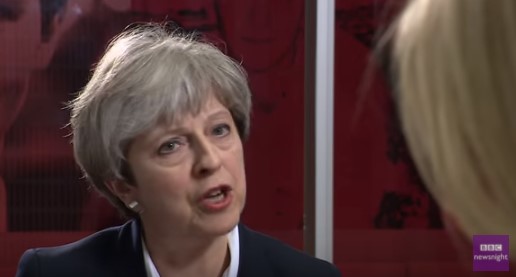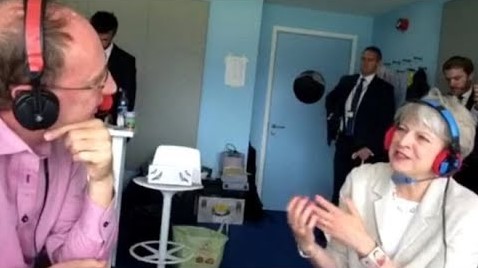Pausing briefly while speaking is a natural part of delivery. We pause for several reason. The most obvious one is to take breath so we can carry on speaking. Some pauses occur before content words or complex clauses suggesting that the cognitive planning processes can delay the output of the words. It has also been suggested that we pause more when we have to make choices in what words and expressions we select to say. So giving ones opinion would include more pause time on average than reporting factual ideas.
Can pausing reveal anything about the intentions and motivations a politician might have when responding to interview questions? Pausing is not something we can normally control so the degree of pausing could be a sign of the subconscious decisions a politician is making when responding to potentially face-threatening questions (in the same way that body language can sometimes tell us what a person is thinking)? Politicians are well known for their ability to equivocate when asked conflictual questions. Could the length of pause between question and answer (sometimes termed the Response Latency) be an indication of equivocation intentions?
Theresa May, the Prime Minster of the United Kingdom, has come under criticism recently for being ‘robotic’ in her interview and somewhat ‘detached’ . She was widely criticised in her interview on BBC Newsnight following the Grenfell Tower fire disaster. While May had visited the scene of the tragedy that day, she failed to meet any of the residents during her visit, something which the interviewer, Emily Matlis, picked up on in the interview. May’s answers to many of the questions appeared planned and equivocal, avoiding many of the emotional undertones that the interviewer was attempting to address.
The following analysis is a brief exploratory study of the length of pauses between question and answers in interviews. It compares Theresa May’s Newsnight interview with a more recent interview she did for Test Match Special (TMS) on BBC Radio 5 Live . This was an informal, lunchtime interview between the presenter, Jonathan Agnew and the Prime Minister. Clearly the occasion and topics discussed are different in these two interviews which makes comparisons problematic. However, in the discussion later I will suggest some ways this can be overcome.
BBC Newsnight Interview

First, let’s look at the BBC Newsnight interview with Emily Matlis. I have discussed the Prime Minister’s ‘detachment’ in this interview in a previous post . Here I will just list the 14 question that were asked in the interview and the length of pause (in seconds) between the question and the answer by the PM . The picture above gives the context of the interview which was televised and broadcast on 16th June 2017. The interlocutors are face-to-face sitting down. We do not have any information on who, if anyone, is in the background but can assume a television studio setup.
1. why is that? (1.0) well what I want to talk about today is 2. and accept responsibility (0.3) this has been a- something terrible has happened 3. when you left St Clements (1.1) what I have done since this incident took place 4 no one was in charge (0.6) what er I have er done today 5. when are they told where they are going to be housed (0.0) it has been a terrifying experience for people 6. and there was nobody willing to accept responsibility (1.3) we are ensuring that support is put in place for people 7. don’t have friends don’t have family (0.2) we are committed to ensuring that people are rehoused 8. and they really resented that (1.2) this was terrible tragedy that took place 9. was that not two pounds worth spending (0.3) well we have yet to find out what the cause of the fire was 10. by spending two pounds more on the cladding (0.3) the fire service are looking at what the cause of the fire was 11. you can stop this with a sprinkler system in every block (0.6) and the government has taken action on the 12 he knew about these recommendations then (0.3) no the government acted on recommendations from the coroner’s report 13. when they go to sleep in their beds (0.3) well the government is doing everything in its 14. instead of cutting corners (0.7) what we need to do is to ensure
In total, 14 questions were asked. The average length of pause between the end of the question and the start of the answer was 0.586 seconds. The longest pause measured was 1.3 seconds. (All measurements made by Audacity software).
TMS Interview (selected QAs)

TMS (Test Match Special) is a radio programme which broadcasts on BBC Radio 5 Live, providing commentary on cricket matches. As part of the lunchtime routine, a well-know guest is often invited for an informal chat on a variety of topics.
The TMS interview with Theresa May occurred on 8th September 2017. Jonathan Agnew was the interviewer. As the picture below shows, the two interlocutors were sitting face-to-face. Headphones were used because it is a radio broadcast, not television. Some people, possibly aides and security personnel, can be seen the background.
The TMS interview at 33 minutes was longer than the Newsnight interview so I have selected question-answer pairs at roughly equal intervals, ignoring the first and last three minutes of the interview. On each line of the transcript below, the approximate timing in m:ss from the start of the interview is given first, followed by the interviewer’s words, the length of pause in seconds (in brackets) and then a few words of May’s response.
1. 3:04 glad to see you have brought an offering (0.1) I have indeed yes 2. 3:10 you you were pottering round the kitchen last night I know (0.0) I was indeed yes 3. 3:20 erm can can you reveal wha- what they are (0.1) yes 4. 3:28 that’s very nice to a secret secret recipe of any type or? (0.3) no I I don’t know 5. 6:26 introduced you to your husband (0.0) indeed yes 6. 10:27 that won’t have cheered you up too much (0.0) well 7. 15:09 that must hurt (0.0) I don’t think I’m in the least 8. 16.42 firm and strident and in charge and and that’s that’s it (0.4) I think the important thing for people 9. 20:15 is is answer evasion the number one on the list (1.5) no answering 10. 25:22 do you trust Donald Trump though to to not press the button or or be reckless (0.4) no I believe that 11. 30:18 kind of reflects what we’re saying doesn’t it (0.1) yes it it
Listen to the extracts here
11 question-answer pairs have been sampled. The average pause between turns was 0.264 seconds and the longest pause was 1.5 seconds.
Statistics
The two average pause lengths are given in the table below. On the face of things, it seems that the average pause length for the Newsnight interview is longer than the TMS interview. However…
| Average pause between turns | |
| BBC Newsnight interview | 0.586 seconds |
| TMS interview | 0.264 seconds |
… simply reporting the values of the averages does not tell us whether the difference is significant. For this we need to run a statistical test called the ‘t-test’. The list of averages is given below. The values can be put into SPSS software or an online calculator can be used such as GraphPad which has been used here.
Newsnight: 1, 0.3, 1.1, 0.6, 0, 1.3, 0.2, 1.2, 0.3, 0.3, 0.6, 0.3, 0.3, 0.7 TMS: 0.1, 0, 0.1, 0.3, 0, 0, 0, 0.4, 1.5, 0.4, 0.1
Running the calculator for an unpaired t-test produces the following output:
Unpaired t test results
P value and statistical significance:
The two-tailed P value equals 0.0730
By conventional criteria, this difference is considered to be not quite statistically significant.
Results
Somewhat against the hypothesis that we have been suggesting, the significance of the difference in averages is outside the 0.05 confidence level (P=0.0730) that we would normally accept. The result is ‘not quite statistically significant’ as GraphPad tells us. There could be a number of reasons for this. One reason might be due to the small sample of data. We only have 14 data points from the Newsnight interview and fewer still from the TMS interview. Increasing the number of data points might produce a result that is more reliable and statistically significant.
Since this is an exploratory study based on a limited set of data, a P value just outside the 0.05 confidence level would mean that we would be justified in taking this methodology further into a larger study which could be carried out potentially by an undergraduate student for their final-year dissertation. This study would need to consider a greater number of interviews, some political and some non-political, to see if there was a significant difference in pause length.
The methodology would need to be tightened up a bit. For example, what constitutes a question in an interview? When interlocutors are fighting for the floor, there is often overlap or latching. These cases would probably be excluded from the calculations. A question for the purposes of this study could be defined as say two full clauses from the interviewer without any backchannel noise from the interviewee.
Another way to investigate the issue would be to look within an interview rather than across interviews to see if there are differences in response time. Comparing a formal political interview with an informal chat on a radio station is problematic because the topics addressed differ so much and the sense of occasion is different. However we could compare pauses within an interview by dividing the answers into unequivocal and equivocal responses. One hypothesis then could be: does the interviewee pause longer before equivocal answers compared with unequivocal answers?
Discussion
While the results of this exploratory study haven’t produced a significant result, it is useful to speculate on what might cause a politician to pause before an answer and whether the type and quality of answer they produce is a factor in this. One possibility is that producing an equivocal response to a face-threatening question requires some planning in the thought processes which manifests itself in a subconscious micropause before answering. It is interesting to note that in the TMS interview, the longest pause by the PM was 1.5 seconds which was in response to arguable the most difficult question posed by the interviewer. The interviewer was asking about Theresa May’s strategy at Prime Minister’s questions in the House of Commons, which takes place most Wednesday lunchtimes, and whether she tries to evade questions. May hesitated 1.5 second before answering. Could this be a sign of the planning processes going on in the mind as she chooses the most appropriate answer – one that won’t create any headlines?
9. 20:15 is is answer evasion the number one on the list (1.5) no answering
This contrasts with some of the earlier responses on less face-threatening questions such as whether she had brought in some cakes for the commentators to share (‘an offering’ as is often the case with visitors to the TMS studio).
1. 3:04 glad to see you have brought an offering (0.1) I have indeed yes
It is also interesting to note that in the BBC Newsnight interview, the PM’s answers sometimes come in pairs and the first answer in the pair has a longer pause of the two. When she repeats the answer a second time, the pause is shorter.
3. (1.1) what I have done ... 4. (0.6) what I have done ... 6. (1.3) we are ensuring ... 7. (0.2) we are committed to ensuring ...
There could however be other explanations for longer pauses. For some speakers, it can be a conscious strategic choice particular with people in positions of power such as politicians. Pausing before answering questions can often signify greater power within the conversation over that of the interviewer. It is well known that Clarence Thomas, a USA Supreme Court Judge, paused significantly before responding to answers in his confirmation hearings in 1991 which gave him an air of authority in his answers. (Although this can work against interviewees in some context, e.g. job interviews.) Or a politician may feel that an important occasion, such as just after a major fire in which lives have been lost, demands a degree of respect and distance which is partially achieved through longer pauses.
Whatever the reasons for pausing, it is clearly a complicated issue but one which is well worth investigating further.
BBC Newsnight, 16th June 2017, https://www.youtube.com/watch?v=ftY1NlPk5YY
TMS, 8th September 2017, https://www.youtube.com/watch?v=JrsqzIIUW70




Leave a Reply
You must be logged in to post a comment.